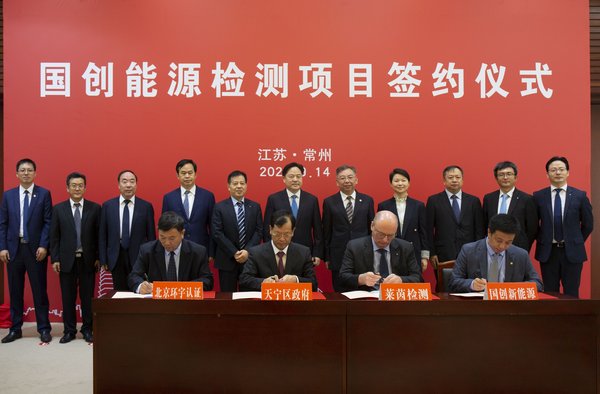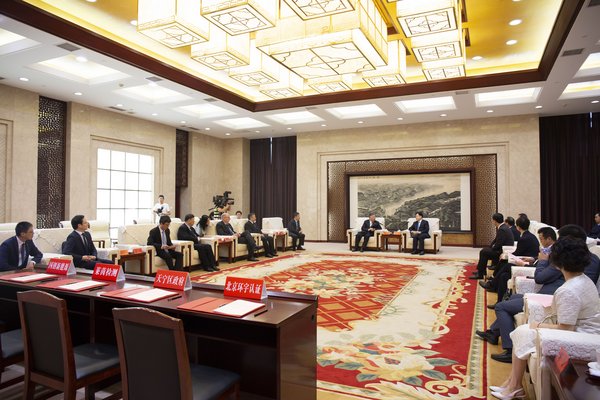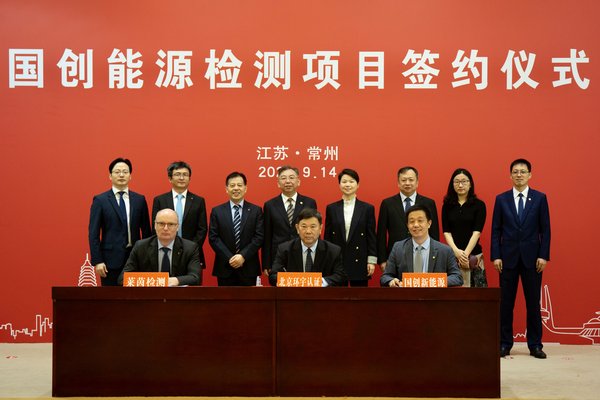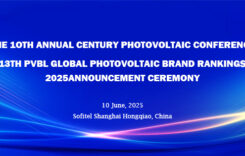TUV Rheinland, CQC, and National NEV Technology Innovation Centre will establish a joint venture
PVTIME – On September 14, TUV Rheinland Group (“TUV Rheinland”), Changzhou Tianning District People’s Government, Beijing CQC Huanyu Technology Development Co., Ltd. (CQC Huanyu), an investment platform subordinate to the China Quality Certification Centre (CQC), and National New Energy Vehicle Smart Energy Equipment Innovation Centre (Jiangsu) Co., Ltd. (“National NEV Technology Innovation Centre”) held a signing ceremony of cooperation agreement. TUV Rheinland, the CQC, and the National NEV Technology Innovation Centre will establish the National Innovation of Energy Testing Technology (China) Co., Ltd. (“Joint Venture”) in Changzhou. With the support of Tianning District People’s Government, the Joint Venture will be set up in the Sino-Europe (Changzhou) Testing, Inspection and Certification International Cooperation Industrial Park, focusing on the implementation of testing projects on NEV charging and swapping facilities, systems, equipment, and related parts and components.

Xu Xiaobo, Chief Executive of Tianning District People’s Government, Lutz Frankholz, Managing Director of TUV Rheinland Shanghai, Wang Yongjian, General Manager of CQC Huanyu, Zheng Junyi, Vice Chairman of Wanbang Digital Energy Co., Ltd. (“Wanbang Digital Energy”) and Chairman of the National NEV Technology Innovation Centre, signed the agreement as representatives of the four parties.
On hand to witness the signing was Chen Jinhu, Mayor of Changzhou Municipal People’s Government, Li Zhongbang, President of China Certification & Inspection Group (CCIC), Wong Yushun, CEO and President of TUV Rheinland Greater China, Shao Danwei, Chairman and President of Wanbang Digital Energy, Hang Yong, Deputy Mayor and Secretary General of Changzhou Municipal People’s Government, Qi Shuang, Deputy Director of the CQC, Song Jianwei, Party Secretary of the Tianning District Committee, Xia Bo, Vice President of TUV Rheinland Greater China Business Stream Products, Cao Zhiwei, Member of the Standing Committee of the Tianning District Party Committee and Secretary of the Tianning Economic Development Zone Party Working Committee, Xu Jun, Director of the CQC Branch (Nanjing), Yuan Quanchi, Deputy Director of the Research Office of Changzhou Municipal People’s Government, Li Weichun, Global Head of Power Electronics Business Segment and General Manager of Greater China Solar & Commercial Products at TUV Rheinland, and Xia Min, Deputy Director of the Management Committee of Tianning Economic Development Zone.

A government work report released in May 2020 explicitly proposed to “build more charging facilities and promote wider use of NEVs.” Effective investment will be expanded this year, and priority will be given to stepping up the construction of new types of infrastructure, developing next-generation information networks, and boosting industrial upgrading. The development of “new infrastructure” will open up development opportunities for NEV charging piles.
Under the cooperation agreement, with support from the Tianning District People’s Government, TUV Rheinland, the CQC, and the National NEV Technology Innovation Centre will draw on their resources and qualifications at home and abroad in a commitment to build a world-class testing laboratory for NEV charging and swapping facilities, systems, equipment, and related parts and components. They will also achieve “mutual recognition of one test by many countries,” meaning products that have passed one test can simultaneously obtain relevant certifications in China, America, the European Union, and other countries and regions. This will help Chinese enterprises engaged in charging and swapping facilities to continuously improve product quality and technological strength, and gain access to the global market.
As a leading global technical service provider, TUV Rheinland boasts more than one hundred years of technology experience accumulation in the field of automotive testing and certification. It can provide one-stop comprehensive services for electric vehicles, core components, and charging facilities for NEVs, including electrical safety, electromagnetic compatibility (EMC), battery safety, functional safety, information safety, post-crash safety, charging interfaces and protocols, market access, etc. It is committed to establishing a unified standard system. TUV Rheinland, with nearly 10 years of experience in the field of charging and swapping systems, can provide product testing and certification for charging piles, charging stations, pantographs, swapping stations, charging cables, charging connectors, and related components. It also offers audits and technical evaluations for charging and swapping systems, and comprehensive localized services such as training for charging pile installers, operator qualification audits, and on-site installation audits for automobile manufacturers and charging operation service providers.
As the largest certification organization in China, the CQC provides comprehensive technological services, R&D training, testing and certification for electric vehicles and related industries, as well as technological support for the implementation and promotion of national policies. Its third-party certification and evaluation services for the entire industry chain of electric vehicles and charging piles will not only help control and improve the quality of products and ensure basic safety, but also break barriers among industries, reduce transaction and management costs, and facilitate trade.
Under the guidance of the Department of Industry and Information Technology of Jiangsu Province, the National NEV Technology Innovation Centre was jointly established by 12 shareholder entities, including producers of NEVs and charging & swapping infrastructure, enterprises engaged in energy, battery electric drive & electric control and energy information, universities, and scientific research institutes. It is designed to integrate domestic and foreign NEV industry resources, establish an ecosystem for the NEV smart energy equipment industry chain, and conduct research on key generic technologies to achieve efficient commercialization of research results.
Drawing on each other’s advantages, TUV Rheinland, the CQC, and the National NEV Technology Innovation Centre will combine general requirements with customer demands and build a testing laboratory that meets the needs of major global automobile enterprises, charging and swapping enterprises, new infrastructure, and consumers, promoting the high-quality and sustainable development of the industry.












